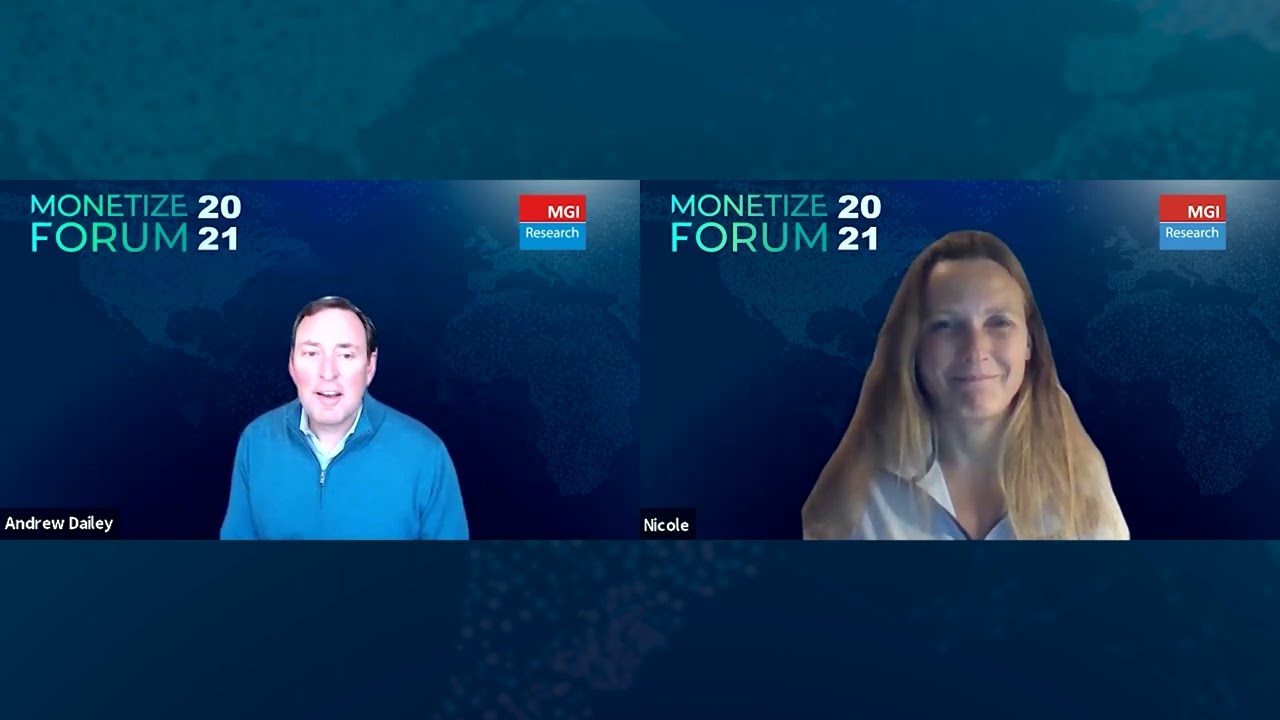In choosing the right billing solution for your company, it’s hard enough to determine which specific offering out there best meets the finance functionality needs of your organization today. Identifying which solution will then continue to support you as you grow and scale in the future further complicates the decision. Enter the in-solution: Zone Advanced Billing was born out of the Zone & Company founders’ experience helping businesses scale their financial operations on NetSuite. Head of Billing Solutions Brad Mortimore joined MGI Research analyst Andrew Dailey at the 2021 Monetize Forum to talk more about the unique benefits of in-solutions and how they provide NetSuite users the security of knowing the next level of support is ready to deploy whenever they need it.
Key Issues
What are the advantages of a services company’s solution over one from a pure software developer?
At what point in a company’s use of an ERP does an in-solution come into play?
What can businesses do to optimize the value of chosen solutions?
Guest Profile
Brad started his career in finance and accounting before joining NetSuite as a Sr. Solution Consultant, working directly with hundreds of software technology companies looking to scale their financial operations on NetSuite. Brad then joined Zone & Co to help grow and scale their subscription billing offering—Zone Advanced Billing—built entirely within NetSuite.
Andrew Dailey
Hello, everyone. This is Andrew Dailey of MGI Research, and welcome to our session, “The Power of In-Solutions: A New Way to Monetize in NetSuite.” I’m joined by Brad Mortimore, the Head of Billing Solutions at Zone Advanced Billing. Brad, welcome to the Monetize Forum.
Brad Mortimore
Hi, Andrew. Thanks for having me.
Andrew Dailey
For those who aren’t familiar with Zone & Company and Zone Advanced Billing, what’s the backstory of Zone?
Brad Mortimore
Sure. Zone & Company is a NetSuite solution provider. Prior to starting Zone, our two co-founders actually worked together at a software technology company that ran its business on NetSuite. They were part of that organization’s growth from a small, privately held company with a dozen or so employees all the way to its becoming a publicly traded company with thousands of employees. And they directly impacted and helped scale that company’s financial operations on top of the NetSuite platform, including a lot of their billing and revenue recognition.
They both decided to branch off and start Zone & Company so that they could take that experience and start offering it to other similar companies also experiencing that growth. We were working with a lot of companies that were trying to automate billing, revenue recognition, and their reporting automation using NetSuite, and, at the time, we were leveraging really what was available to us. We were trying our best to leverage out-of-the-box NetSuite functionality for billing and to build integrations to third-party applications and have them integrate to NetSuite.
However, I feel like both we and our customers were left wanting a little bit more. It seemed like in each of those approaches, there were always some trade-offs that we needed to make. So, with some of our customers, we started to propose, “We can leverage NetSuite. We could build a billing solution inside of NetSuite for you, leveraging the platform.” We did that for a couple of customers as one-off projects, custom billing solutions designed specifically for them, but that’s really where Zone Advanced Billing was born.
We took all of that experience that our founders gained trying to build integrations to other third-party solutions while scaling that software company plus the experience that we gained building custom solutions, and that’s where Zone Advanced Billing started. Fast forward several years, and now it’s a product that’s available on the SuiteCloud platform. It’s available on SuiteApps, and it’s now the number one billing and monetization tool specifically for NetSuite customers.
Andrew Dailey
You describe it as an “in-solution.” That’s a relatively new term, even for folks like myself who have been around this business too long. What exactly is an in-solution, and what are the unique benefits? What differentiates that from an app?
Brad Mortimore
Very simply, an in-solution is a solution that is built inside of another. It’s not a solution that integrates with another one, it’s not a solution that has a little widget window within a solution, and it’s not a solution that has a punch-out window from one solution to the other. It is completely embedded within and is part of the technology fabric of that other solution. If you think about companies like Salesforce and NetSuite (arguably the first two companies to offer 100% cloud-based solutions), they recognized the need for and value in giving access to their platform that allowed third parties to develop solutions and expand upon the functionality and the solutions they can provide. Salesforce has the Force.com platform, and NetSuite has SuiteCloud platform.
So, Zone Advanced Billing leverages that SuiteCloud platform, and it’s built entirely inside NetSuite, almost as if NetSuite and Zone Advanced Billing were one solution. I kind of like to say that users of NetSuite would never know the difference between whether they’re using NetSuite or Zone Advanced Billing because they’re completely intertwined into the same user experience.
Andrew Dailey
Got it. So, Zone & Company, as you just mentioned, is a NetSuite services partner and also a software developer. We’re seeing more and more services companies like Zone develop and bring to market applications specifically in the monetization space. From your point of view, what are the unique benefits of buying from a services company that’s offering an application? Why should I go with that over a pure software developer?
Brad Mortimore
I think as software companies that offer a product grow, they increasingly tend to move further and further away from servicing those very same customers. As apparent in its backstory, Zone Advanced Billing was born out of experiencing the same pain that our customers felt. We tried our best to build solutions for them, and we just never felt like we found the right solution. So, Zone Advanced Billing was created from our customers’ experience, and it also continues to be enhanced and developed based on feedback from our customers. Often, much of our product roadmap and new features is customer-driven.
I also think that, as a services company, we maybe approach our solution a little bit more holistically. Because we’re working with these companies, we understand that billing and revenue recognition are just two operations among many for a company. As a services company, we’re focused on how our solution fits seamlessly within the broader operations of a company, whether it be inventory management, CRM, or front-end e-commerce solutions. We take that focus around how our solution fits in versus focusing on our product in a vacuum and saying, “These are the new products and features we’re rolling out.”
Andrew Dailey
Where do you draw the line between when it makes sense for a company to use the billing capability that’s native to NetSuite and when it makes sense to use the billing and rev rec functionality that’s in-solution through Zone? How should a customer make that decision? What are the use cases that would push you in one direction versus the other?
Brad Mortimore
I think the answer to that is very contextual. There are a lot of questions you can ask: What industry are they in? What stage of growth are they in? Do they have the capital or the funding to expand upon their NetSuite? What level of pain are they feeling within current processes? The list goes on and on in terms of what the actual trigger point is that says, “Now is the time to use Zone Advanced Billing.”
That said, I think a lot of our NetSuite customers appreciate that, if they plan on growing—expanding the products and services that they offer or moving into new markets—at some point within their growth, they’re probably going to need a tool like Zone Advanced Billing just to keep up with the pace of innovation and the pace at which they’re offering new products. So, whether a customer needs Zone Advanced Billing right away or in a year or two years, I think it gives them a lot of comfort knowing that they can invest in NetSuite and eventually use Zone Advanced Billing whenever that time comes.
Andrew Dailey
Yes. One of the traditional concerns customers are faced with when looking at a services company that has software solutions is whether that software piece is going to stay with the services company or get spun out at some point. Obviously, the valuation of a software product is different than the valuation of a services company. You may not want to or be willing to answer this, but is there ever any thought of spinning the Advanced Billing piece out of Zone & Company, or will it always be this kind of symbiotic piece of the business?
Brad Mortimore
No, I think that’s a good question, and it’s one that we’re also asking ourselves and are in the process of discovering the right answer to. But I think, in the process of figuring out the right answer, our most important priority is that we service our Zone customers now, and we continue to service them forever. Regardless of how we brand ourselves, market ourselves, or structure our organization, that really is the number one priority. So, I think it’s something we’re also discovering ourselves.
Andrew Dailey
Let’s step back for a minute and just talk about the case. One of the choices here is to try to address these issues, these needs, as much as possible through a single solution. As you described, in the case of Salesforce, you can pick different pieces and pull them together. In your mind, what’s the case for centralized billing, finance, collections, rev rec—all in one, versus doing things from multiple pieces?
Brad Mortimore
Accounting is tough. My background is in accounting, my education is in accounting, and my early professional career is in accounting. By nature of what we do, I work and speak with accountants on a daily basis. If you were to pose the question to any accountant, “Would you rather have separate systems for billing revenue collections and your general ledger or have a single system?” I would bet that the answer would almost unanimously be that they would rather have a single system.
There are many reasons for that. If you think about accounting standards like ASC 606 and IFRS 15 (two of the more recent revenue recognition standards), in order to stay compliant, you need interaction not just with billing but revenue recognition as well. So, as contracts change; you have upsells and downsells; and there are cancellations, uplifts, or contract extensions—all of those things have billing implications, but they have revenue recognition implications as well.
So, keeping those very close is important. I think a lot of the third-party systems and tools are recognizing that, which is why you see a lot of these tools also offering rev rec solutions. Many of them will have rev rec capability built within their platform, or they may offer another tool that’s a revenue recognition tool. That’s good because they do need to be together, but it’s still not solving the final problem, which is that you’ve now separated two critical functions of your accounting from your general ledger and your ERP system.
Essentially, what you’ve created is a subledger architecture system where you have an accounts receivable subledger and a revenue recognition or deferred revenue subledger, and if you think about where the future of accounting is going (and even where NetSuite is already), we’re eliminating the subledger architecture. The future is a data-rich general ledger, a real-time general ledger. You’re posting detailed transactions to the general ledger. Going with a point solution, stripping this out, and creating a subledger architecture is almost going backwards considering where the accounting world is moving forward to.
So, having that access to real-time information inside of a single system, particularly for us with NetSuite, is extremely important. Additionally, you can think about NetSuite as a whole and why we’ve put our bet into NetSuite. NetSuite offers solutions for retail companies, wholesale distribution, software companies, and services companies. There are specific pieces of functionality that NetSuite offers, and we want the billing and the revenue recognition to be married with the rest of the operations that the business is using, not separated in a disparate system.
Andrew Dailey
Got it. NetSuite has a very strong customer base—a growing customer base specifically within technology companies and emerging growth software and cloud companies. You get engaged in a lot of your customer projects firsthand, so you’re seeing a lot of what’s going on there. In your experience, what really distinguishes the topmost performers from the rest of the pack in terms of implementation, adoption, and ongoing best practices? What separates the really good finance functions and really top-performing businesses when it comes to these projects?
Brad Mortimore
In my opinion, the top-performing companies are the ones who invest in the software that they own—and I don’t just mean in terms of monetarily purchasing. I mean investing people, time, and resources into the software; really taking ownership of that software; and training individuals to become power users or having a group or an individual in charge of administration. The companies that take that time to really invest in the solutions that they own end up getting the most out of them.
Often (and especially nowadays as we’re still facing the pandemic and recession), those are the customers of ours that seem to emerge as the most successful, but this is true not just for Zone and NetSuite but for any platform, and I think it’s also true in any stage of the process, whether they’re in evaluation of a software, implementation of a software, or even ongoing optimization or support of a software.
Andrew Dailey
Yes, absolutely. I completely agree that it’s really important to get from a single individual or a small group of individuals to spreading it to a whole team and the broader organization. So, with that, I’d like to thank Brad Mortimore, the Head of Billing Solutions at Zone Advanced Billing. Brad, thanks for your time today.
Brad Mortimore
Yes, thank you very much. Thanks for having me.
Andrew Dailey
There’s more information at the Zone booth, and you’re going to be around for the Q&A and, hopefully, the networking. Either way, people can reach out with more questions. So, thanks everyone for joining us, and enjoy the rest of the Monetize Forum.
Brad Mortimore
Thank you.




